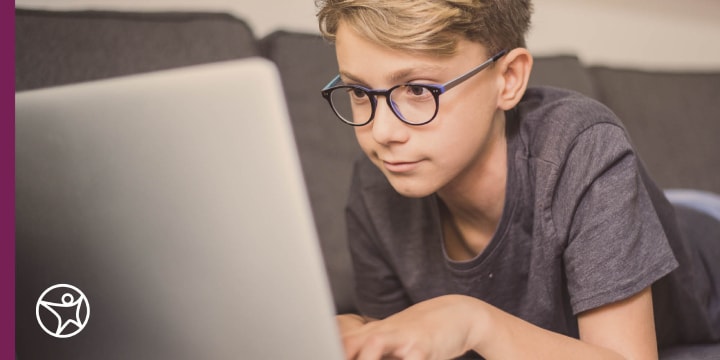Setting Healthy Screen Time Limits for Students Learning Online
by Julie Hersum
byKristina Cappetta
5 min to readFrom TikTok to Instagram to Snapchat, social media is everywhere in our modern society. It’s one of the major ways we communicate with one another, and it can seem like everyone is on at least one of the platforms. But should children join them?
According to recent reports, teens spend an average of nearly five hours a day on social media sites, with YouTube, Instagram, and TikTok among the most popular. Research indicates that too much social media use can negatively impact a child’s habits, emotions, and thoughts. This is why it is important for parents and Learning Coaches to educate themselves about social media safety for kids and help children build healthy social media habits.
From becoming the victims of cyberbullying to having low self-esteem, social media can negatively affect children in many ways.
Teens who use social media for more than three hours a day are more likely to experience symptoms associated with depression and anxiety. A negative self-image can come from even moderate social media usage because posts can portray a distorted view of reality where teens feel like they don’t measure up to the images they see. They feel inadequate and often develop a fear of missing out (FOMO) because they think they are missing out on a better life.
Social media use can also expose children to an influx of distressing news as they scroll through various sites. Known as “doomscrolling,” kids consume negative images and videos even if they know they cause discomfort, anxiety, and trepidation about the world around them.
Prioritizing online relationships and interactions—especially when the student does not know the person offline—can cause loneliness and make them feel like they cannot form real connections with their peers.
Spending time on social media sites before bed may disrupt their sleep. Being on devices like phones and tablets emit blue light, which can suppress the production of melatonin, making it difficult to fall asleep and get a full night’s rest.
When kids don’t get enough sleep, they’re not only irritable, but they can lose concentration at school, leading to academic problems.
While there are drawbacks to children having too much exposure to social media, not all social media use is bad. Research by the U.S. Surgeon General’s office found that social media use can have a positive impact on young people by inspiring them and empowering self-expression.
Social media can also be a source of valuable information in moderation, allowing kids to keep up on current events. Research also shows that social media can have a positive impact on kids by allowing them to develop relationships with people who they may not have the opportunity to meet or stay in contact with in-person, such as family members who live on the other side of the world or friends who have moved away.
While social media should be limited to children who are at least 13 years old, there are several reasons why kids may benefit from access to social media in moderation.
In order to take advantage of the benefits of social media use, kids need to use it responsibly. Parents and Learning Coaches can promote social media safety for kids by reminding young people of these tips:
Remind your child to never share personal information, including photos of themselves, phone numbers, their home address, or anything else that might allow a stranger to find them. Encourage them to turn on privacy settings on their social media accounts to prevent them from inadvertently sharing this type of personal information.
If you think your child is spending too much time on social media, set time limits so it does not interfere with their schoolwork, sleep, or health. There are parental controls that will deny access to sites when a time limit has been reached. You may also want to set device-free zones in your home. This can be during meals or before bed.
When it comes to social media safety for kids, it’s important to have a discussion with your child about the dangers of talking to strangers online. Be sure they know to always tell you or a trusted adult if they are being harassed online or receive uncomfortable messages of any kind.
Helping your child develop healthy social media habits can not only prevent them from getting into danger, but it can also help them develop skills for all online interactions, including those at online school. To learn more about the online school opportunities that Connections Academy offers, as well as the online school experience, get in touch with our team to request your free eGuide.
